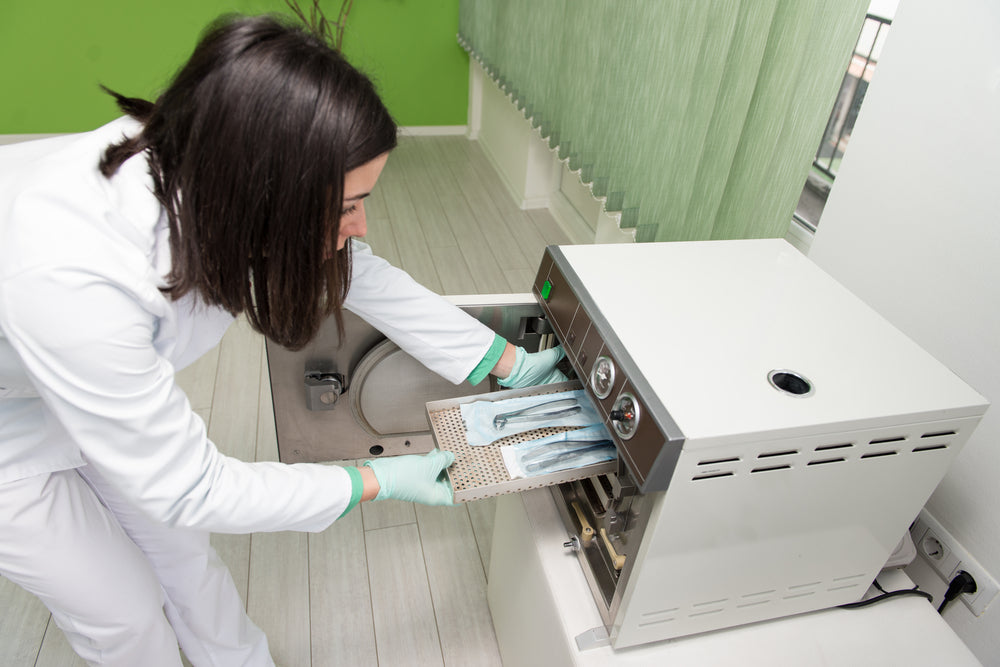Dentists play a critical role in maintaining oral health and preventing tooth decay. Along with the common challenges and responsibilities of oral health care, dentists must also take extra precautions to clean and disinfect their instruments. Their skills, expertise, and use of practical instruments and techniques all play a crucial role in overall oral health. However, with all of the responsibilities of being a dentist, what do they use to clean their dentist tools?
The process of instrument cleaning is one that is often overlooked but is essential to preventing the spread of infection. Infection control is a critical issue in dental care, and proper disinfection of dental instruments is key to preventing the spread of disease.
Different Cleaning Tools for Dental Equipment
Dental cleaning tools are part of every dentist's arsenal. Depending on the type of dental equipment being used, there are a variety of dental cleaning tools that can be employed. Here are some of the most common:
- Ultrasonic Cleaners
- Alcohol-Based Sanitisers
- Dental Compressor
- Autoclaves
Ultrasonic Cleaners
Ultrasonic cleaners use high-frequency sound waves to create cavitation bubbles. These bubbles collapse and create a powerful scrubbing action that can remove dental plaque, tartar, and other debris. This equipment can help kill bacteria that may be present on dental instruments. Ultrasonic cleaners are often used on dental handpieces, scalers, and other dental tools. They come in a variety of sizes and can be either portable or stationary. Most dental clinics own at least one ultrasonic cleaner.
Alcohol-Based Sanitisers
Alcohol-based sanitisers are effective at killing bacteria and viruses. They work by denaturing the proteins that make up the cell wall of the microorganism. This destroys the organism and renders it unable to reproduce.
Dental Compressor
One of the most important dentist cleaning tools, a dental compressor, works by blasting dental instruments with a high-pressure stream of air. This high pressure helps remove debris and loosens stubborn plaque and tartar, making the equipment easier to clean. The compressor also helps dry dental instruments, which is vital for preventing the growth of bacteria.
Autoclaves
Autoclaves use pressurised steam to kill bacteria and other microorganisms. This sterilisation process effectively eliminates even the most resistant strains of bacteria. Autoclaves are often used in different medical settings and are an important part of dental instrument cleaning.

Sterilisation Tips for Dental Equipment
Every dental office has its own unique sterilisation protocol to protect patients from cross-contamination. However, there are a few basic tips that all dental professionals can follow to ensure that their equipment is properly sanitised.
- Use a brush and detergent before autoclaving dental tools.
- Check the autoclave’s indicator to make sure that it is working properly.
- Eliminate air pockets from instruments before sterilising.
- Use distilled water in ultrasonic cleaners.
- Make sure dental instruments are completely dry before autoclaving.
- Check to see that all dental tools are properly autoclavable.
- Use a validated sterilisation process.
- Store dental equipment in a clean, dry place.
Cleaning the instruments with a detergent before placing them in an autoclave machine ensures that all debris is removed. It also helps to loosen any stubborn plaque or tartar, allowing for the autoclaving process to be more effective. Additionally, keeping the tools dry prior to autoclaving prevents rust and corrosion.
The high pressure and heat of the autoclave can cause moisture to build upon the tools, leading to bacteria growth. Using distilled water is an essential step in ensuring that the dental tools are properly sanitised. The distilled water helps to remove any impurities from the water and prevents mineral build-up on the tools. Tap water or other impure water sources can contain contaminants, making the sterilisation process less effective.
Buy High-Quality Dental Equipment, Supplies & Tools!
A dental clinic's success depends on the quality of its dental equipment. When shopping for new dental tools and supplies, it is important to find reputable brands that offer high-quality products. Just like how you'd carefully select the tools you'll use for your dental clinic, one should also take the exact measures while choosing a good quality dental equipment and tools supplier.
Medical Equipment Services is one of the pioneers and leading suppliers of quality dental equipment, tools and supplies. We offer a wide variety of products that are made from the finest materials to ensure durability and reliability. Customer service and satisfaction are our top priorities, and we are proud to offer the best products and prices in the market. Should you wish to learn more about our products or services, please do not hesitate to contact us for an extensive list of products we offer.
Please call us today on 1300 342 013 or contact us through our website.


